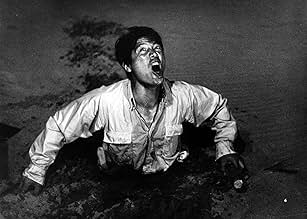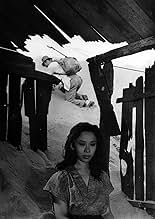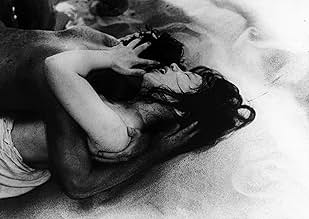An entomologist on vacation is trapped by local villagers into living with a woman whose life task is shoveling sand for them.An entomologist on vacation is trapped by local villagers into living with a woman whose life task is shoveling sand for them.An entomologist on vacation is trapped by local villagers into living with a woman whose life task is shoveling sand for them.
- Nominated for 2 Oscars
- 11 wins & 3 nominations total
Featured reviews
I watched this movie on a Japanese Film Festival in Berlin in 1993. I can't remember all the details but the movie really mesmerized me. It is a very unique work and I wonder why it doesn't have the cult status of other movies.
The psychology between the two is excellently depicted. The tension is intensified trough images of sweaty skin and running sand. The cinematographer is a master in filming this. Lots of black. Editing also is sharp and very well done. Sound is minimal and fits the images' bleak and deserted dunes.
Much can be said about this movie, it is one for repeated viewings for sure.
Niki immediately questions the woman, as to why she would live in such a desolate place, in a ramshackle house where the sand is constantly flowing through holes in the roof and he is amazed to find that her nightly Sisyphean task involves filling baskets with sand that has blown into the pit and having it hoisted up by the locals. After feeding him, the woman tells him he doesn't have to help on his first night here, he finds this a curious statement as he is only staying one night? The truth behind the pit is soon revealed as Niki finds that there is no way out of the pit, the rope ladder having been removed by the locals.
Teshigahara is perhaps best known for his surreal and existential works, Woman in the Dunes fits right into this category. The setting of the sand dunes with the blinding sun gives the film an otherworldly dreamlike quality, with continuing rivers of sand also adding to this quality. The revelation that he is being kept captive is also a rather scary and intriguing, the film traces Niki's mixed emotions of anger and aggression, his denial of his captors, his change of heart and the fact he would stop at nothing to get the merest of rewards from them. His transformation is complete as he himself turns into a captor, of the woman that he now shares his life with.
The film is an epic at almost 2 ½ hours, its pace is incredibly slow but strangely it still doesn't feel that long, this viewer being drawn in to the complexities of the film. There's also a very sensual and sexual subtext, with the burning heat and little to do during the day and with the woman's recommendation that they sleep naked because the sand will chaff them, it is inevitable that sexual liaisons will happen and they do, sometimes it rough and ready and they wrestle each other, sometimes its sensuous as they provocatively wash the sand from each other in some very intimate moments.
Woman of the Dunes I have heard is full of subtext and hidden meanings, some are contradictory to the writer and directors visions so its hard to tell exactly on this my first viewing, exactly what they are so I will not even try to do so, I'll just sit back and let the film wash through my mind again and maybe it will all fall into place. The ending is controversial I would say, I can imagine it causes divide amongst those who have seen it, but in the context of the surreal setting and qualities of the film, I think it suits it fine, if nothing else it will get you talking about it, I think it's a film ripe for over analysis, so again I won't.
I voted "nine" for this wonderful film, in part because it left me with a lot to think about, in part just for how well it was made. The music by Toru Takemitsu is absolutely perfect for the task, too.
This is just about my favorite kind of film: one that raises important questions about human life, but not at the expense of entertainment. It's as close as I'll probably ever come to having my cake and eating it, too.
Update, January 2007: I finally obtained my own DVD of this film, one with much higher quality photographic reproduction. I now marvel even more at the extraordinarily creative photography. Be sure, if you view this on DVD, not to boost your set's brightness: I can assure you the film is very, very dark on purpose. If possible, see it on a high-definition monitor. Today, I'd vote "ten."
Did you know
- TriviaFor this film, Hiroshi Teshigahara became the first Japanese director to be nominated for an Oscar for directing.
- GoofsThe beard of teacher Jumpei is not growing, despite him even complaining about no opportunity to shorten it.
- Quotes
Entomologist Niki Jumpei: The certificates we use to make certain of one another: contracts, licenses, ID cards, permits, deeds, certifications, registrations, carry permits, union cards, testimonials, bills, IOUs, temporary permits, letters of consent, income statements, certificates of custody, even proof of pedigree. Is that all of them? Have I forgotten any? Men and women are slaves to their fear of being cheated. In turn they dream up new certificates to prove their innocence. No one can say where it will end. They seem endless.
- ConnectionsFeatured in Music for the Movies: Tôru Takemitsu (1994)
- How long is Woman in the Dunes?Powered by Alexa
Details
- Runtime
- 2h 27m(147 min)
- Color
- Aspect ratio
- 1.37 : 1


















